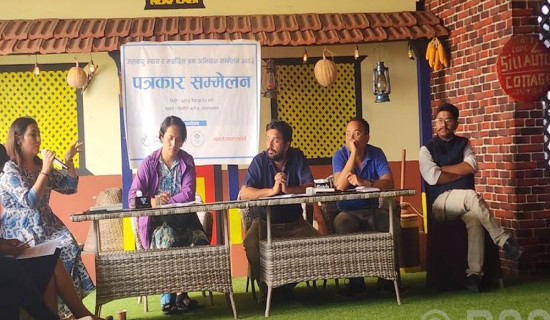- Saturday, 3 May 2025
Risky bamboo transport through Koshi waters continues
BY KABI RAJ GHIMIRE,Hile, Apr. 10: Raj Kumar Rai, 30, of Tribeni in Sahidbhumi Rural Municipality-1, has been carrying bamboo through the water of the Sapta Koshi for 20 years.
During these two decades, he had put his life at risk for countless times while carrying the bamboo through the mighty river. Sapta Koshi is the largest river in Nepal.
He said, “Carrying bamboo through water, popularly called Chefa in the local dialect, is always a risky job. I was a bit scared when I first carried the bamboo floating it in the river. But when I got paid for my work after reaching the destination, all my fear disappeared and I became more confident.”
Sailing on a river sitting and standing on a bundle of bamboo without any safety measure is a highly risky job.
However, the locals have been making earnings by carrying the bamboo through the Sapta Koshi River and its tributaries by ignoring all the risk associated with their life.
The bamboo carried in this way is also known as ‘Chefa Ko Baas’. Such bamboo is transported to the Terai region from Dhankuta, Bhojpur, Udayapur and other districts in the hills through the Sunkoshi, Arun, Tamor and Sapta Koshi rivers. Hundreds of bundles of bamboo are transported to Chatara in Sunsari via the Sapta Koshi every year.
From Chatara, local businessmen take it to Dharan, Itahari, Biratnagar and other markets, said Moti Chandra Rai, a local. At one time, the income is up to Rs. 15,000 depending on the number of the bamboo pieces. But locals have been risking their lives for this meagre amount. There are big rocks in the middle of the river and bamboo bundles could bang, throwing the men sitting on them into the river.
Locals say that while carrying the bamboo, they meet accident when the baboo hits the rock. According to them, more than five persons had lost their lives so far in Dhankuta, Bhojpur and Udayapur areas. However, police said no one had ever filed a complaint regarding human disappearance and loss while carrying the bamboo.
Due to lack of safety measures and resources, the locals carrying the bamboo in the water are left with no option but to swim when an accident takes place. But, if the accidents happen in uncomfortable places, chances of survival by swimming are slim.
Carrying bamboo has been an important source of income for the residents of the mountainous districts. Since the bamboo started getting good prices in the urban areas of the Terai, many men have been carrying the bamboo through the waters of the rivers risking their life. Though roads have
reached villages and transportation facilities have been available, these men are mobilised for transporting the bamboo through waters because transporting through water is cheaper than through the road vehicles.
However, there is no official data about the quantity of the bamboo transported through the waters. According to Raj Kumar Rai, a single family living near the river bank in Dhankuta, Bhojpur and Udayapur earn up to Rs. 150,000 every year by carrying bamboo through waters and selling them in Chatara, Sunsari.
















